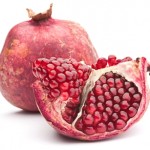Pomegranate Season Arrives

 October ushers in pomegranate season in Lebanon, bringing this healthy and delicious fruit to carts and shops across the country. Believed to have originated in what is today Iran, the fruit dates back thousands of years and has been mentioned in holy books, including the Old Testament and the Quran.
October ushers in pomegranate season in Lebanon, bringing this healthy and delicious fruit to carts and shops across the country. Believed to have originated in what is today Iran, the fruit dates back thousands of years and has been mentioned in holy books, including the Old Testament and the Quran.
Pomegranates are planted in many Mediterranean countries. In Lebanon, they grow on the coast as well as mountainous areas, cultivated by rainfall.
The fruit comes in sour and sweet varieties but both types have immense health benefits.
“Pomegranates are a great source of antioxidants. In fact, research has shown that their antioxidant content is two or three times higher than that of red wine,” dietician Nicole Maftoum says.
“Their content of punicalagins, a potent antioxidant component, is very high and responsible for all the health benefits this sweet and juicy fruit presents,” she adds.
Citing many studies, Maftoum explains that daily consumption of pomegranates over a period of three months could minimize the oxidation of LDL cholesterol, thus reducing the thickening of the arteries as it also improves the blood flow to the heart and lowers blood pressure.
Enjoying the fruit in its natural form is not the end of the story, as pomegranate molasses and juice are delicious alternatives.
Used in sauces, dressings, marinades, chicken, salads and many other dishes, pomegranates molasses is made from sour pomegranates.
If you are a pomegranate lover and excited to make pomegranate molasses at home, preparing the thick syrup is not a complicated process, though it takes a bit of time.
The process requires squeezing the juice from sour pomegranates, then boiling the liquid until it reduces to a thick syrup, which usually takes few hours.
Consuming pomegranate molasses has positive effects on the nervous system and facilitates digestion.
“Niacin, [which is] present in pomegranate molasses, helps the skin to remain elastic, keeps the nervous system healthy and aids in digestion of food,” nutritionist Diana Wazne explains.
She adds that pregnant women should consume pomegranate molasses, as niacin is essential for proper brain growth in the fetus.
Wazne also notes that the molasses can be mixed with mustard oil and used as an ointment to firm a woman’s chest.
For his part, Ibrahim Omari, a specialist in family medicine, says that pomegranate juice helps to combat different types of cancer.
He says that studies in mice indicate pomegranate juice may inhibit the development of lung cancer and slow the growth of prostate cancer.
“In a study of 50 men who had undergone treatment for prostate cancer, eight ounces of pomegranate juice [250 ml] per day kept PSA [Prostate-Specific Antigen] levels stable, reducing the need for further treatment, such as chemotherapy or hormone therapy,” he explains.
Pomegranates can destroy breast cancer cells while leaving healthy cells and may even prevent breast cancer cells from forming. They can also improve sexual performance.
“I came across another study done in Edinburgh where they tested its effect on sexual desire in men and women, it can enhance it by increasing the level of testosterone,” Omari says.
For her part, Mftoum explains that pomegranates are a good source of vitamin B (riboflavin, thiamin and niacin) as well as vitamin C and A, which aid in healing and regenerating tissues. Pomegranates also contain calcium and phosphorus.
Given all these health benefits, pomegranates and their products should not be missed this month. But exercise caution when it comes to those difficult pomegranates stains.
It is important to remove any pomegranate spilled on your clothes as soon as possible, as the longer it sits on your clothes, the more difficult it becomes to clean up.
___
(c)2012 The Daily Star (Beirut, Lebanon)
Visit The Daily Star (Beirut, Lebanon) at www.dailystar.com.lb/
Distributed by MCT Information Services